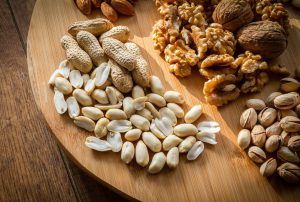It’s time to talk about “the girls.” October is Breast Cancer Awareness Month, so there’s going to be a lot of focus on preventing, detecting, and fighting breast cancer this month – and all of that is incredibly important! But since we’re already focused a few inches below your collarbone, let’s take this time to look at (or talk about, sorry) all aspects of your breasts and answer some of the common questions people with breasts have about them. What’s “normal”? Is there anything you should be concerned about and what are some common issues that often crop up? And do you need some support in your relationship with your dynamic duo?
Why Am I, Um, Lopsided?

Here’s the thing: there are very few things in nature that are perfectly symmetrical, and breasts are no different. It’s perfectly normal for one breast to be larger than the other, even by a whole cup size! This asymmetry might be more pronounced while you’re developing during puberty, or even after breastfeeding, if your baby preferred one side (and stretched it out – thanks, baby!); if you’re bothered by the way it looks in clothing, you can try buying a bra in the bigger size and adding a pad to the smaller side – but remember, you are certainly not in the minority if your breasts look different, and you shouldn’t stress about it.
Should I Be Checking Myself and What If I Feel a Lump?
Doctors used to be pretty militant about doing self exams on a rigid schedule, but nowadays they’re giving more relaxed advice, so that people with breasts don’t panic over every change they feel. The advice now is to combine knowing your breasts well (the way you might know the moles on your body) with getting yearly exams, and talking to your doctor about any concerning changes.
And if you do find an unusual lump? First, don’t panic. Next, speak to your doctor, keeping in mind that it is not necessarily cancer, and might be one of those benign lumps that comes and goes on its own, especially if you are younger. Keep in mind also that you’re not going to be whisked off to emergency surgery just because you found an unusual lump, so don’t let that put you off speaking to your doctor.
Finally, it’s important to remember that lumps are not the only symptom of breast cancer, so, again, make sure you know your breasts well and take note of any other kinds of changes, like discharge, dimpling, pulling in, retraction of the nipple, a persistent rash, or pain.
What’s With the Itching?
If you’ve got boobs, it’s happened to you: the dreaded itchy nip. Breasts are just skin and, as such, are subject to itchiness just like any other part of your body, so there’s usually no need to worry about needing to have a good scratch; most likely, it’s due to dry skin, hormonal fluctuations, or irritation from detergents or body care products.
If your girls are always itching, though, or if you have an itchy rash, talk to your doctor: these symptoms could indicate a condition called Paget’s disease, which can be associated with breast cancer.
Can a Healthy Diet Also Benefit the Boobs?
While researchers are still figuring out exactly how much certain healthy foods can reduce your risk of cancer, there are some promising studies surrounding the following foods and breast cancer risk: 
- Nuts – All types have phytosterols, which have been shown in lab and animal studies to inhibit tumor development; varieties with fatty acids could also help with PMS-related soreness.
- Cruciferous veggies – Broccoli, kale, cabbage, and other good stuff like that contain glucosinolates, which some studies suggest break down into compounds that appear to inhibit the development of cancer cells.
- Mushrooms – One Chinese study found that eating around 10 grams of fungi a day reduced breast cancer risk by 64%.
- Legumes – Beans and lentils also contain phytosterols, and a Harvard University study showed that women who ate legumes at least twice a week had a 24% lower risk of breast cancer than women who ate them less than once a month.
With all of that being said, it’s important to take recommendations about cancer-fighting foods with a grain of salt: there is no one magic food that will take away your risk, and it’s important to remember that an all-around healthy lifestyle is important for helping to reduce your risk.
Ouch! Why Do They Hurt?
It doesn’t happen to everyone, but you might find that your breasts feel sore, or even swollen, lumpy or tender right before your period, and it’s usually nothing to worry about, it’s just those pesky hormones acting up. The important thing is to know your breasts, so that you can detect any unusual pain or lumpiness.
Stray Hairs, Darkening Skin, Protruding Nipples – Are My Areolas Normal?
Thinking that there are some funky things going on with your nipples and areolas, the area of darker-colored skin around your nipple? Whatever is happening, unless it’s really out of the ordinary, like discharge, scaliness, or another type of rash, is probably normal, and it’s important to remember that everyone’s areolas and nipples are different colors, sizes, and shapes. They might get darker during pregnancy, and might even stay that way – and, in general, whatever color they are is normal.

As for nipple protrusion, again, everyone’s are different and some tend to stand at attention more than others – the only thing you would need to get checked out in this regard is if your nipples all of a sudden became inverted, not more prominent, since nipple inversion can be a sign of breast cancer.
Got bumps? Those little bumps all around your nipples are also something that everyones has, so those are nothing to worry about, either: they’re called Montgomery Glands, which are sebaceous glands that produce an oily substance called sebum that lubricates the skin. And those stray hairs? Also completely normal, although a lot of nipple hair may signal a hormonal imbalance like polycystic ovary syndrome; if it’s just a few, you can either leave them or safely pluck ‘em out!
So, Are They Supposed to Sag?
Short answer: yes. Maybe yours are as perky as perky can be, but that is by no means true for everyone, and it’s pretty much guaranteed that everyone’s will eventually lose their bounce – and the elasticity of their skin. What contributes to the southward migration?
- Pregnancy – This is the more likely culprit than breastfeeding, contrary to what many people think. During pregnancy, and after birth when your milk comes in (which happens to everyone, even those who don’t breastfeed), your breasts grow and then eventually shrink back down again, and that can stretch the skin and ligaments.
- Aging – The ligaments holding your breasts up are made of collagen and elastin, which break down as you age.
- Tanning – Yup, catching too many rays also breaks down collagen.
What doesn’t cause your breasts to sag? Not wearing a bra all the time – the only exception is a sports bra. If you’re going for a run or doing some high impact exercise, keep the girls in lockdown to avoid damaging the ligaments over time.
How Can I Feel Better About Them?
With all of the above being said, it’s important to remember that all breasts are different, and some are going to sag (can we think of a better word for that??) more than others; they also come in all different shapes and sizes, just like their owners – in fact, most are oblong shaped and tend to have nipples that face downward!
The problem is not with the breasts themselves, the problem is what we’re told what breasts should be and how they should look. Breasts tend to be viewed as objects instead of body parts, and that can make us expect them to be more “flawless” than they are ever going to be. It can be easier said than done to take that to heart, but if you feel insecure about the way yours look, know that you’re not alone and try checking out some body positivity or body neutrality groups to gain a new perspective – sure, pushup bras and all that jazz are great if they make you feel good (and if they do, wear them with pride!), but dealing with your feelings about your body and the expectations around it is also vital to your mental health. And remember: ditch the negative self-talk!
Are There Specific Risk Factors for Breast Cancer?
When it comes to breast cancer risk, there are actually a lot of factors that can affect your chances of developing the disease; some you can control, and unfortunately, some you can’t. They include:
- Being overweight (especially after menopause)
- Sedentary lifestyle
- Your age – Over two-thirds of cases are in women over 55
- Genetics – Around 10% of cases are hereditary
- Alcohol – Having two or three drinks a day could increase your risk by up to 20%
- Fat intake – In a 2014 study, women who ate the most saturated fat had a 28% higher risk of hormone receptor–positive cancer
In the end, big or small, love ‘em or have a complicated relationship with ‘em, your breasts are a part of you – but only one part! They don’t define you and you get to choose if you flaunt them, hide them, use them to nourish another human, or just treat them like the body part that they are. Just remember, however you treat them, keep them healthy by eating right, exercising, and knowing them well enough to detect any changes in them – we want you and your girls to have a loving relationship for years to come!